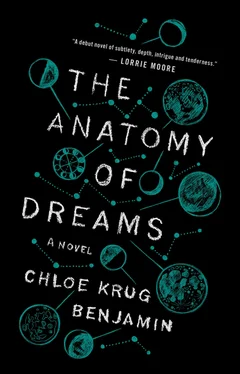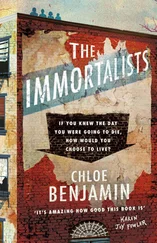She was living in a squat, sixties apartment building in the Gourmet Ghetto (“Hideous—we’re talking wood-paneled walls and orange shag carpeting, but what can you do?”) with her ex-boyfriend, a chef at the same restaurant (“Don’t ask—it’s about as terrible as it sounds, but it’s only for another nine weeks, not that I’m counting, and on the upside, he’s obsessively tidy and does all of my dishes”). Their lease was up at the end of July, and she needed a new roommate.
“I’d love to have you, obviously,” she said. It was nine in the morning in California, and I could hear her bustling around the kitchen: the clink of a knife, plates rattling, the swift wheeze of a window being pushed up. “But what would you do here?”
“I’ve been thinking about going back to school, actually,” I said. It was true—I still had that damn application for readmission, and it was becoming clear that this was my best option. I knew that if I lived with my parents for much longer I’d become self-pityingly depressed, and I needed a college degree. “I could come out in August, get a job waiting tables while I work on my application. Maybe I could start up in the spring semester.”
And that was what happened. I spent the early summer tying up loose ends in Newark, not that I had many: I packed my bags, trashed my mementos of Snake Hollow and my photos of Gabe. I ate more consecutive dinners with my parents than I ever had as a kid. In June, Rodney came home from college, where he was studying creative writing; in the evening, we kicked a Hacky Sack around as the sun’s golden yolk smeared the backyard. After weeks of apartment hunting, Hannah found a turrety little Victorian just blocks from her restaurant. She sent me photos via e-mail: two bedrooms, a turquoise-tiled bathroom, space for a garden.
I could put Gabe out of my mind during the day, but at night, memories of him throbbed beneath my skin. I dreamed of his off-kilter smile, the particular tenor of his voice, and woke sweaty and gasping. I didn’t pick up his phone calls, though each one was a fresh puncture, followed by a dull ache that lasted for days. If he asked me to come back, if he told me again that he loved me, I didn’t trust myself to move to California. It would be so easy to slip back into our life together before I even knew I was doing it—to edge quietly through the door like a teenager returning after a long night out, to climb the stairs and take my old, soft place beside him in bed. He would wake up to find me there, fold his body around mine in habit before the surprise of it registered. But I would have to return to Keller, too—to the bare halls of the lab, the perpetual exhaustion, and the stagnant, indoor air. I felt as if I’d spent years within the glass segments and cyclical view of a revolving door. Outside, I was so dizzy that I could probably have fainted on command, but at least there was wind.
Gabe wasn’t the only one who called me. My cell phone rang constantly, the area codes ranging from Madison to Massachusetts, and the voice mails were all from Keller. In the beginning, they were curt— Sylvia, it’s Adrian; I need you to call me —but as the days passed, his voice became strained, an undercurrent of panic impossible to cover up. He called from the private number at the lab, his Boston-based cell phone, and eventually, from pay phones. Ignoring him made me feel sickened and blasphemous, but I never picked up.
Instead, I wrote a letter. The silver lining of Anne March’s trial was that it gave me a prepackaged excuse. I can still recall, with mild embarrassment, the convolution of the first paragraph: Though the past three years of my life have been dedicated to my work with you, and I have believed in that work as ardently as my conscience has allowed, certain events of late have forced me to see our research, and its terrible complications, in a new light. It is with great sadness that I recuse myself from an effort in which I have been so profoundly invested, but I can no longer ignore the evidence that suggests our work has been of primarily negative consequence to the lives of our participants and their loved ones.
I wrote that I wouldn’t share the details of our work with the media or the police, and I’ve kept that promise, though I’ve never been able to figure out whether it was for their sake or my own. In return, I asked Gabe not to tell Keller what I’d learned. I’ve no idea whether he honored his part of the pact; in any event, when the case against Anne came to a sudden close later that summer—Anne changed her plea to guilty and was sentenced, without a trial, to twenty-six years in a federal prison for women—Keller’s calls dwindled to a stop.
Maybe even he knew by then that an era was coming to a close. While in Berkeley, I followed him and Gabe from afar. They continued on for another two years, traveling like vagabonds from one college town to the next. They spent the fall after I left in Ann Arbor, the spring in Bloomington. From there, the universities became more and more obscure. After the 2005-2006 academic year, which they spent in a small New York college so far upstate that it bordered Canada, their work was no longer tied to any school at all.
I’ve often wondered how they felt in those final months, when the East Coast was just beginning to wake after a winter in hibernation. Were they filled with despair, so incongruous when the outside world was in bloom? Or did they surrender quietly? They must have known that their time had come and gone. As the twenty-first century continued, nobody wanted to learn how to live in their dreams—they just wanted to stay asleep. Out was the touchy-feely naval-gazing of the eighties and nineties; when gas prices were soaring, ice caps were melting, and resources were becoming thin, insurance was the best thing money could buy. You’ll Sleep Like a Baby , one mattress ad promised—and what was more attractive, more elusive, than that sort of ignorance, harder-won in adulthood but no less blessed?
I should have felt a sense of redemption when Interactive Lucid Dreaming finally dissolved, but all I felt was mourning. Until that moment, the research itself had stood as witness to my life, both personal and professional. When Keller dropped out of the academic landscape, his work as brief and brilliant as a species gone extinct, it was as if none of it had ever happened at all.
20. BERKELEY, CALIFORNIA, 2005
Five months after I left Madison, in October of 2005, my mother called on the half-broken Nokia I’d brought to Berkeley. A letter had come to my parents’ house, addressed to me. At least, it appeared to be a letter: it was a thick, large envelope, taped shut over the tack. Three stamps were pressed in the upper left corner. The return address was Gabe’s. She had mailed it to me.
“Don’t read it,” said Hannah. “It’ll only torture you. Who cares what he has to say?”
Hannah was, and still is, the only person who knows the story in all its humiliating detail. I had already told her about how I’d reconnected with Gabe and had left school to join him, but she knew nothing of my work with Keller until our first night in California. We were sitting on the living room couch, eating takeout from the vegan place down the block whose utter lack of cheese and meat made it clear I was no longer in Wisconsin. The room was hedged with boxes, and I barely recognized Hannah: the slight, wiry girl I’d known at Mills had became tall and womanly, butter skinned, her curly hair piled in a bun and held with chopsticks. She had gained weight, but it suited her: with her sturdy, round thighs and flushed cheeks, she looked as if she had grown into the body she was always meant to have. I couldn’t help it. I began to cry.
Читать дальше












